Sure, the Western is the quintessential American movie genre. It's a homegrown fantasy spun out of not who we are but who we think
we are. It combines nostalgia for a time before pollution, highways,
and Starbucks with an adventurous can-do spirit that believes anything
is possible and anything can be tamed — even if that desire to settle
means we'll eventually be stuck with pollution, highways, and
Starbucks. The Western takes many shapes
and forms, and though it's fundamentally American, it doesn't even have
to be American. Some of the very best Westerns have been produced far
from the United States.
As much as the Western is an escape,
it's also a mirror reflection of our aspirations, of our national
identity, our relationship to violence, and our relationship to
America's history of violence. Yes, the Western is not about who we are
but who we think we are...but who we think we are at any given time can
say a lot about us.
This Fourth of July, The Lone Ranger
gallops into theaters offering up a new take on sagebrush and saguaro
territory, so we're rounding up our picks for the best of the best that
this greatest American genre has produced. Click through for the 25
Greatest Westerns Ever Made.
25. The Naked Spur (1953)
Director
Anthony Mann took it upon himself to redefine the topography of the
Western. Instead of arid Monument Valley, Utah, where John Ford created
the mesa-centric view of the West, Mann took us to forests, mountains,
and icy rivers. The Naked Spur also shook up Jimmy Stewart's
psychological terrain as a brooding bounty hunter out to nab an outlaw
so as to use the reward to buy back his foreclosed homestead. It hints
at Stewart's darkness to come in Vertigo.
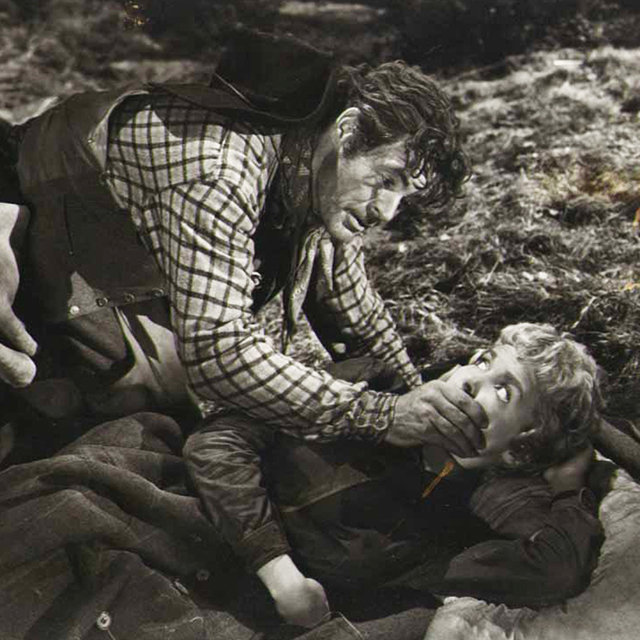
24. The Ruthless Four (1968)
A kind of Treasure of the Sierra Madre
in reverse, Giorgio Capitani’s film has gold miner Van Heflin hit
paydirt at the very beginning. Then, to his misfortune, Heflin hires
three scoundrels (George Hilton, an always-great Gilbert Roland, and
Klaus Kinski, totally deranged) to help transport the bullion back to
civilization. As you can imagine, betrayal and backstabbing ensue.
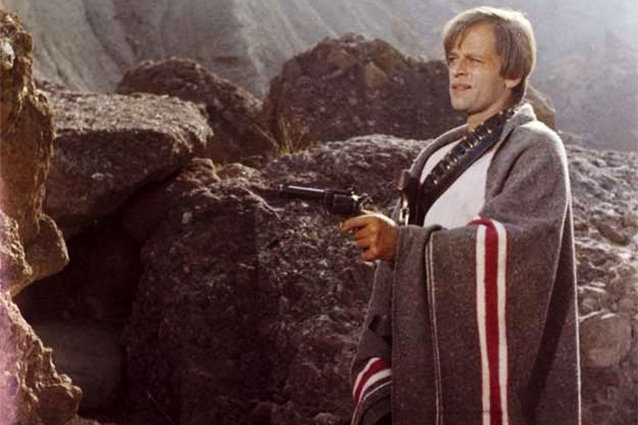
23. My Name Is Nobody (1973)
A comedy Western par excellence, Henry Fonda returns to Leoneland after his legendary villain Frank in Once Upon a Time in the West.
This time he’s decidedly more benign, as an aging gunfighter who just
wants to be left alone but is dogged at every turn by young upstarts
trying to test themselves against his superior skill. One of those
challengers is Nobody (Terence Hill), a possibly unhinged young man
who’s determined to see Fonda’s gunfighter die in a blaze of glory
against the Wild Bunch.
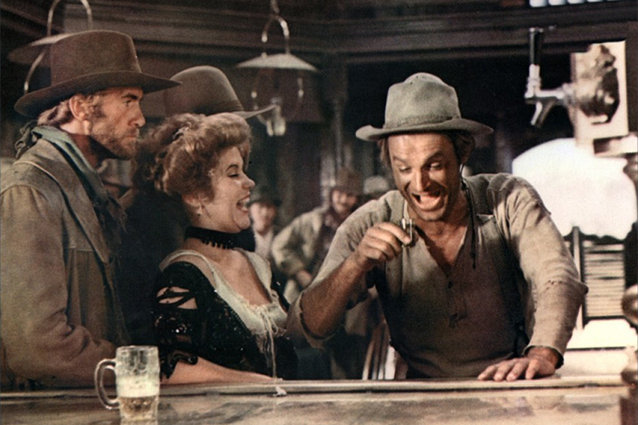
22. The Hanging Tree (1959)
Righteous Gary Cooper faces townspeople morally corrupt enough to give those of Dogville a run for their money. No, this isn't High Noon,
it's Delmer Daves' yarn about a doctor (Cooper) haunted by his past who
nurses a stagecoach robbery victim (Maria Schell) back to life, while
his neighbors think she's offering up illicit payment for his services.
It's a story about the ineffable bonds between people in a fallen world.
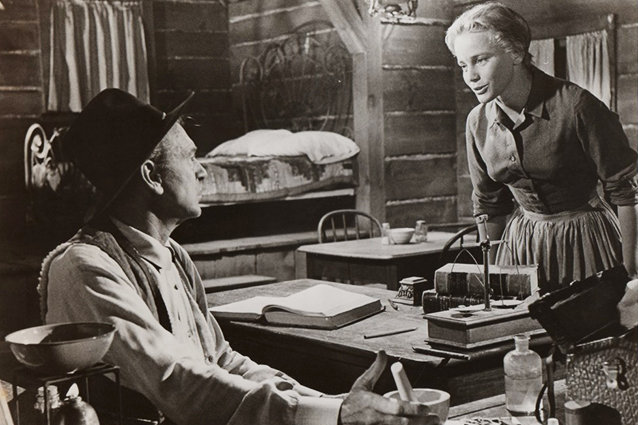
21. The Indian Fighter (1955)
One of
the earliest, and best, revisionist Westerns sees Kirk Douglas try to
stop a war after Walter Matthau swindles the Sioux. A positive,
pro-Native American film with beautiful Oregon Trail cinematography from
B-movie maestro Andre de Toth.
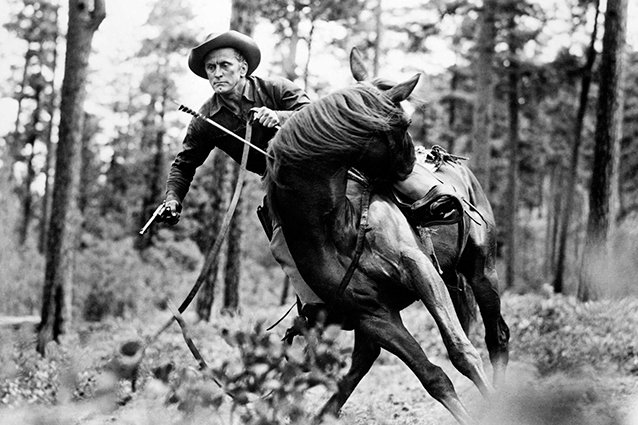
20. Compañeros (1970)
One of the best action comedies you’ll ever see, Sergio Corbucci’s Compañeros
teamed genre heavyweights Franco Nero, as a natty Swedish arms dealer,
and Tomás Milián, as a scruffy revolutionary leader, against a
weed-smoking, one-handed Jack Palance who’s really, really obsessed with a falcon named Marshall.
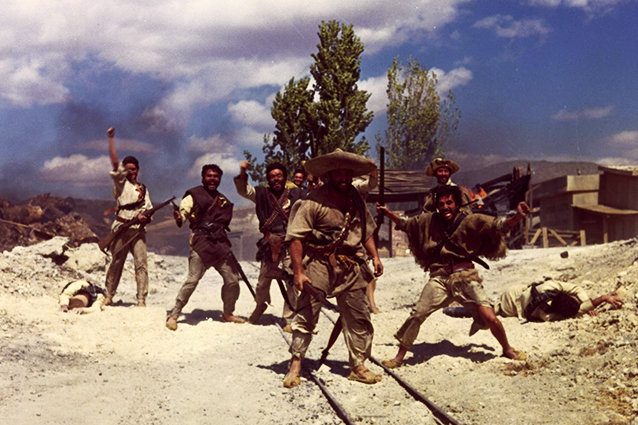
19. The Quick and the Dead (1996)
Four years after he played a sadistic sheriff in Unforgiven
Gene Hackman dons a tin star once again...as a sadistic sheriff! This
time, in Sam Raimi's hyper-stylized meta-Western, he's summoned all the
best gunslingers in the West for a quick-draw tournament. It's like a
bracket game in which the winner will score a big prize...and get to
live. Sharon Stone's shootist, with the help of priest Russell Crowe,
enters the tourney for a chance at revenge against Hackman for a past
crime.
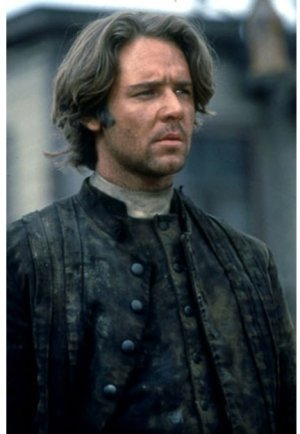
18. For a Few Dollars More (1965)
It’s hard
to think of a more satisfying classical, three-act structure for any
Spaghetti Western than that of the second installment of Sergio Leone’s
“Man With No Name” Trilogy. This time Clint Eastwood is joined by Lee
Van Cleef, in the first of his great Man in Black roles, to track down
an animalistic, dope-fueled bandit named El Indio (the great Gian Maria
Volanté). The Swiss watch-like plotting carries over to the music-box
tinkly soundtrack by Ennio Morricone.
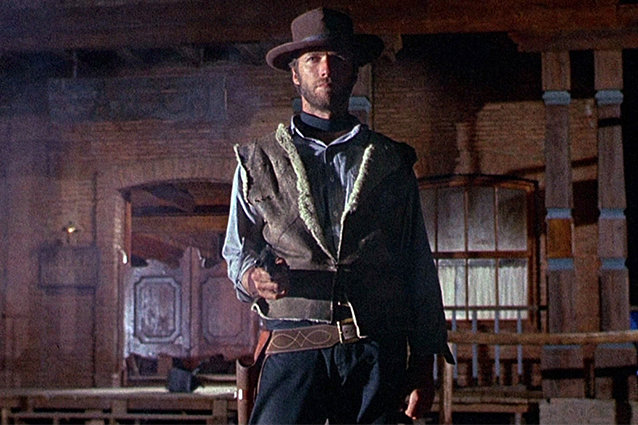
17. Man of the West (1958)
Gary Cooper's very best Western anticipates Unforgiven
by casting him as a reformed outlaw who once again has to embrace the
violent ways he's since shunned in order to survive when he and a couple
others are held captive by his former gang (led by a typically
nihilistic Lee J. Cobb). Fitzgerald wondered if you could repeat the
past. Director Anthony Mann wonders in Man of the West if you can escape it.
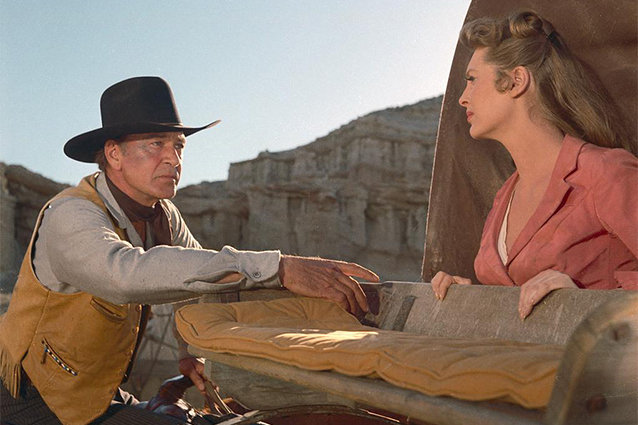
16. Pale Rider (1985)
Clint Eastwood's superior reworking of Shane
takes the germ of George Stevens' original plot — a mysterious
gunslinger arrives in town, protects a small, industrious family from
Big Business, and helps a child grow up — but divorces it from Stevens'
hackwork and adds some gender equality by making the child his
gunslinger instructs be a young girl. For an extra treat, Eastwood even
cast John Russell (Rio Bravo's Nathan Burdette) to be the villain of the piece!
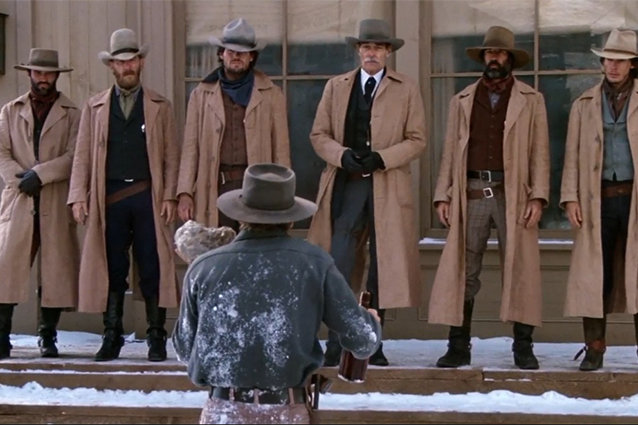
15. The Wild Bunch (1969)
Sam
Peckinpah blew up the Western with dynamite, then riddled its corpse
with hundreds of rounds from a Gatling Gun for good measure. Which is to
say that The Wild Bunch, with its bravura displays of "Let's Top Bonnie and Clyde"
violence, may be a Western for people who don't like Westerns. In 1913,
an aging outlaw gang tries one last score before they're blown away by
history and a modern world that's far more violent than the Wild West.
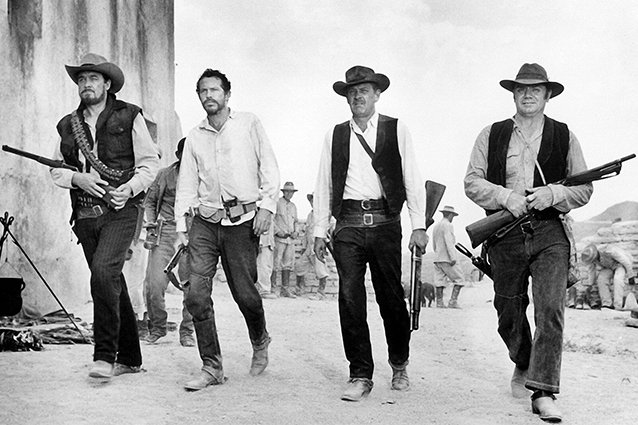
14. McCabe and Mrs Miller (1971)
If the
Western is the canvas where, metaphorically at least, the American
character was formed, capitalism should be a huge part of it. That was
Robert Altman's thinking when he teamed Warren Beatty and Julie Christie
as entrepreneurs looking to establish a brothel in a small town — at
least until Big Business and their hired guns decide to move in.
Beatty's McCabe is a disreputable anti-hero with no real skills, but you
can't help but root for him against the Man in his final snow-covered
shootout.
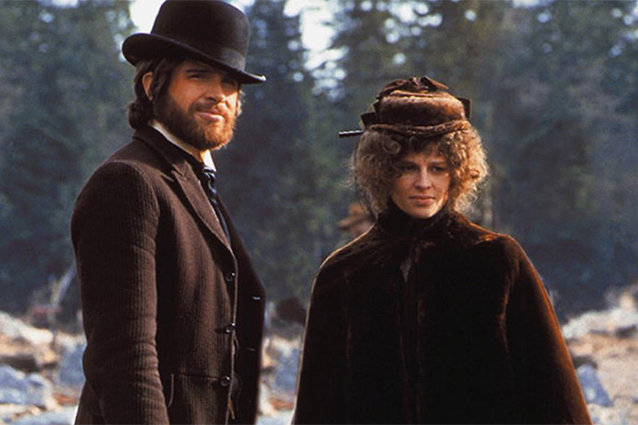
13. The Good The Bad and The Ugly (1966)
A sprawling picaresque of the Civil War Era West, the conclusion of Leone’s “Man With No Name” Trilogy has only one analogue: Don Quixote.
Three magnificent rogues—The Good (Clint Eastwood), who’s anything but;
The Bad (Lee Van Cleef at his squinty-eyed best) who is exactly that,
and The Ugly (Eli Wallach), shaggy-dogged and scratchy— search for a
cache of Confederate gold and face hangmen, bounty hunters, massive
Civil War battles, and each other.
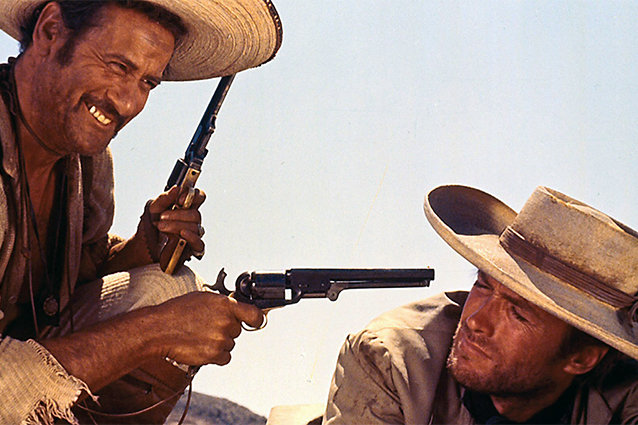
12. The Big Gundown (1966)
Bounty
hunter Lee Van Cleef tracks bandit Tomás Milián, accused of rape and
murder, across Texas and Mexico until he doubts his quarry is guilty.
Director Sergio Sollima crafted an allegory for an American
interventionism in Latin America that ends up harming the average
working man on both sides of the Rio Grande. The message: the
establishment fuels racial prejudice and sexual paranoia as
justification for a society organized to fill the already-full pockets
of the megarich.
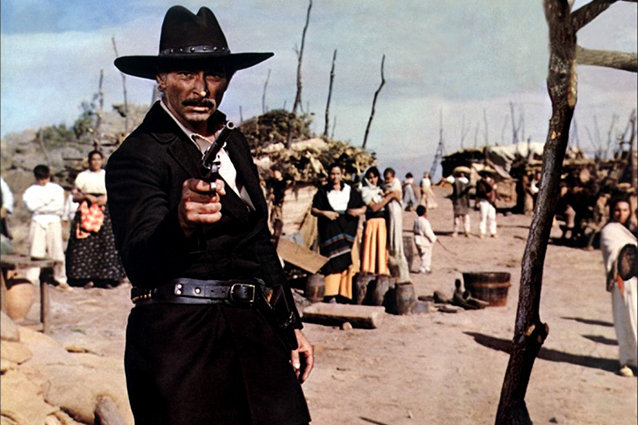
11. Unforgiven (1992)
Clint
Eastwood's last — and best — Western examines the foundational place of
violence, and our simultaneous embrace and denial of it, in American
history. Eastwood's William Munny is a reformed outlaw who's given up
the drink, but he accepts a job to nab a couple cowpokes who mutilated a
prostitute. When he does take a drink again, it's with good reason but
absolutely terrifying. Is Munny victorious or defeated in the end?
Depends how you look at it.
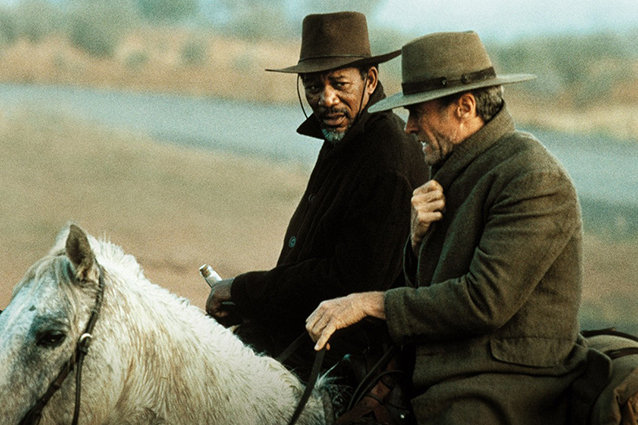
10. Rio Bravo (1959)
The
best hangout movie ever made? Without a doubt. Director Howard Hawks
was a master storyteller, but he also knew complex character dynamics
are more important than any forward-charging plot. John Wayne, Dean
Martin, Ricky Nelson, and Walter Brennan hole up to guard a prisoner,
work out some issues, flirt with Angie Dickinson, and sing songs —
basically like a Shakespeare play, if Shakespeare had ever given us the
song "My Rifle, My Pony, and Me."
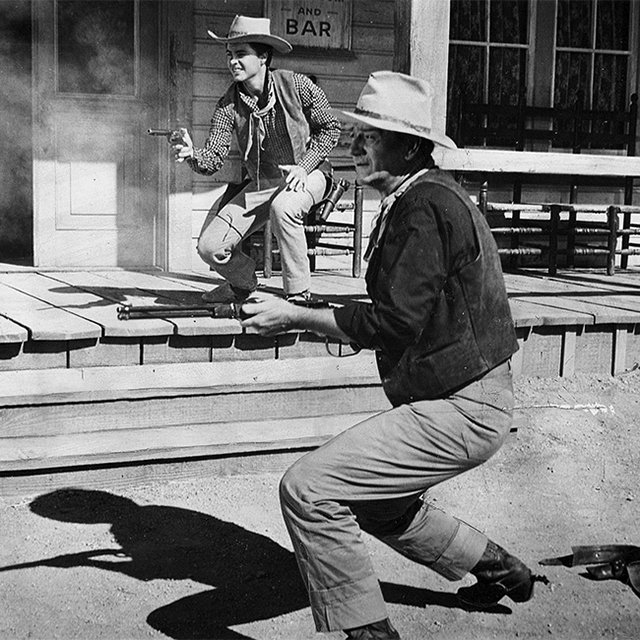
9. Bend of the River (1951)
Jimmy
Stewart and Arthur Kennedy play pals who help lead a wagon train up to
the Columbia River valley to found a new settlement. But they eventually
find themselves on opposite sides as Stewart remains committed to the
settlers while Kennedy wants to sell their much-needed supplies for
cash. Anthony Mann's film is a snow-dappled metaphor for the "Culture of
Production versus Culture of Consumption" divide that would mark the
1950s.
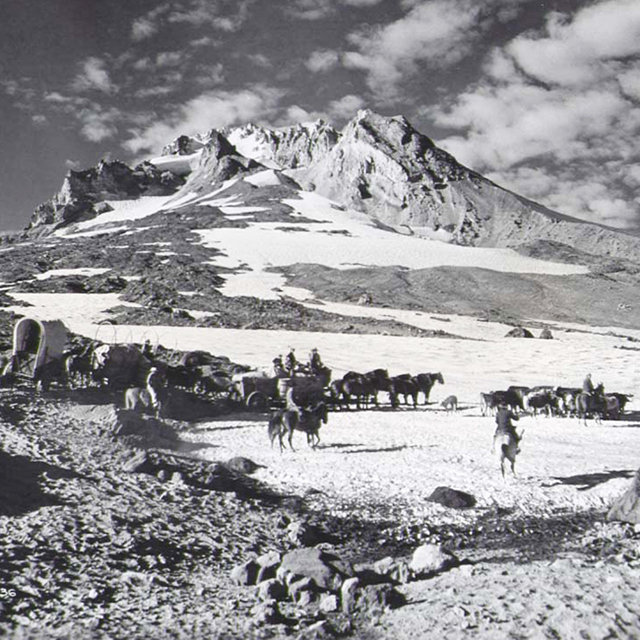
8. Jeremiah Johnson (1972)
Robert
Redford concealed his movie-god looks to play a mountain man in Sydney
Pollack's film that gets to the original existential-loner appeal of the
genre: Redford's Jeremiah left civilization for the mountains "where he
was bettin' on forgettin' all the places that he knew." What, if
anything, damaged him enough to turn his back on humanity? We don't
know. But humanity — an incredible cast of characters, including Stefan
Gierasch's Del Gue (buried) — keeps finding him.
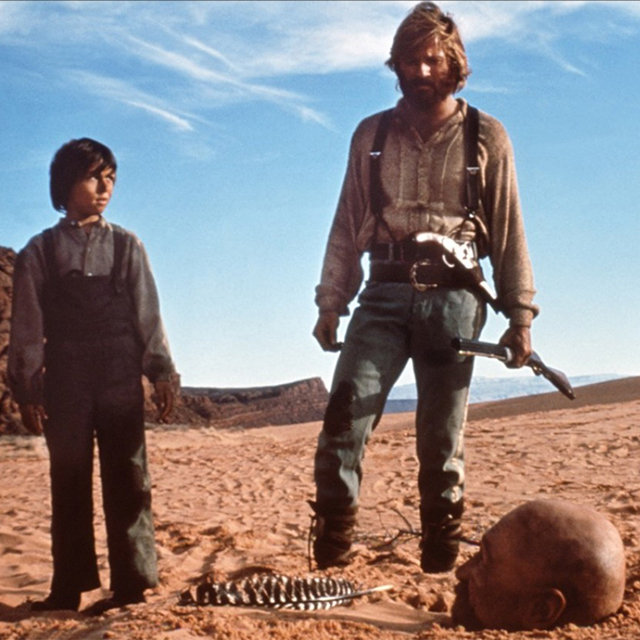
7. The Searchers (1956)
Race,
sex, and class collide in the most expansive film John Ford ever made.
About an ex-Confederate soldier (John Wayne) traversing the West for
seven years to find his Comanche-abducted niece, and then kill her for
the crime of becoming a squaw against her will, The Searchers
uses the Western form to examine America's original sins — particularly
the role of violence in shaping the American character — against a
stunning progression of landscapes. It'll haunt forever.
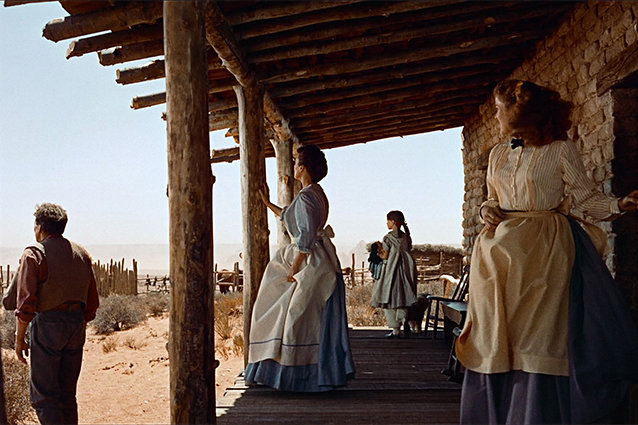
6. Johnny Guitar (1954)
What
begins as a talky chamber drama about a saloon owner (Joan Crawford)
aided by a reformed gunslinger turned guitar player (Sterling Hayden) in
defying the puritanism of the townsfolk unfurls to become a sprawling,
harrowing epic as those townspeople, led by Mercedes McCambridge
(demonic years before voicing The Exorcist's demon), turn murderous. The showdown between gunslingers Crawford and McCambridge is a mana a mana battle for the ages.
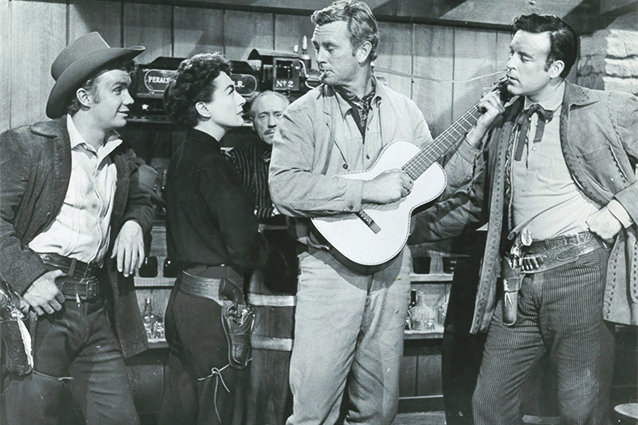
5. Ride Lonesome (1959)
Budd
Boetticher reduced the Western to its morality-play basics. His films
are like minimalist action paintings where what isn't said or done is
just as important as what is. Ride Lonesome stars Randolph
Scott as a bounty hunter interested in more than just a reward, but in
revenge against the outlaw (Lee Van Cleef) who killed his wife. When Van
Cleef says he "almost forgot" killing her, Scott's response, "A man can
do that," sums up Boetticher's view of the banality of violence.
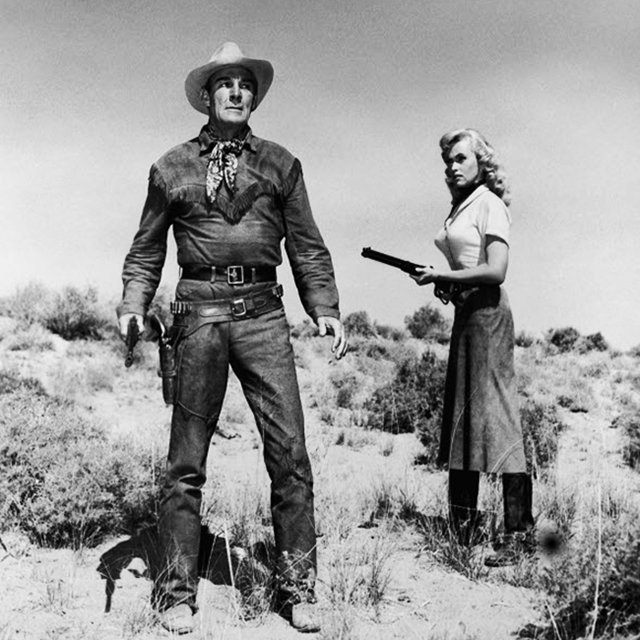
4. She Wore A Yellow Ribbon (1949)
John
Ford's first Technicolor Western is an explosion of painterly images,
with Monument Valley transformed into his own personal canvas. For a
story about a retiring cavalry officer (John Wayne) looking to make
peace with the Cheyenne and Arapaho before he's put out to pasture, Ford
coaxed Wayne to his most subtle performance ever while expressing bold
emotion through his striking landscapes: a blood-red sky draped behind a
cemetery and a thunderstorm rolling across the plains.
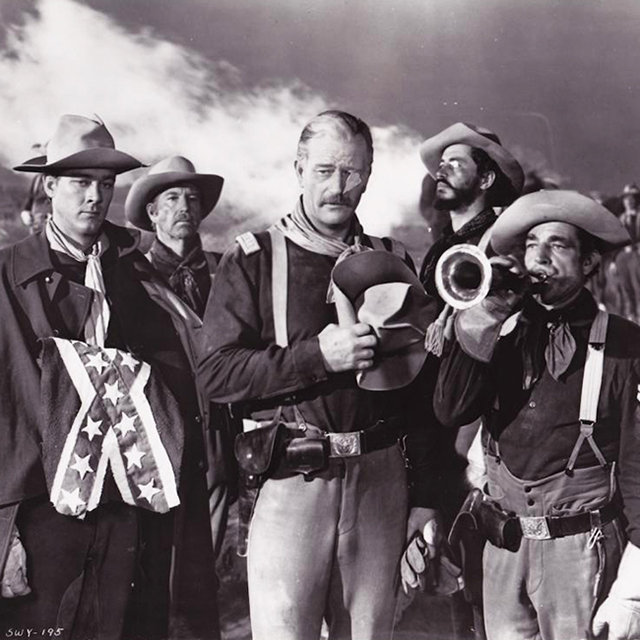
3. The Great Silence (1968)
Sergio
Corbucci ups the ante of the taciturn gunslinger trope, and makes his
hero (Jean-Louis Trintagnant) totally mute. “Silence” seeks the
paper-pushing bureaucrat who cut his throat as a kid (hence, his
inability to speak). That bureaucrat has since begun a genocidal
anti-Mormon campaign in the snow-covered mountains of Utah. Silence
teams up with an African-American woman (Vonetta McGee) whose husband
has been murdered, at the orders of the same guy, for revenge. Embrace
the bleakness.
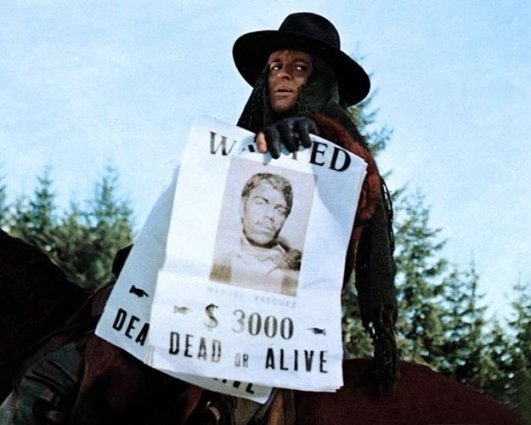
2. Stagecoach (1939)
A
hazy tracking shot toward a twirling rifle, and a star was born. John
Wayne had already been in dozens of Westerns before John Ford tapped him
to play the Ringo Kid, but Stagecoach feels like his first. It
kind of did the same for the genre, injecting propulsive new life into
the Western after dozens of lifeless predecessors in the 1930s. And its
DNA can be detected in everything from Citizen Kane to Star Wars.
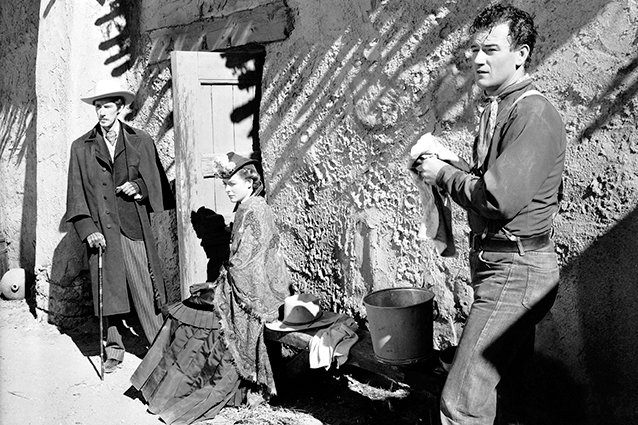
1. Once Upon a Time in the West (1968)
Sergio
Leone completed his rewrite of the Old West with his follow-up to the
“Man With No Name” Trilogy. Charles Bronson is a harmonica-playing
force-to-be-reckoned-with gunning for the railroad enforcer (Henry
Fonda) who killed his brother and threatens a widow (Claudia Cardinale).
It's like Leone distilled the Western to its most minimalist, iconic
foundation-myth elements. Simply, the best.
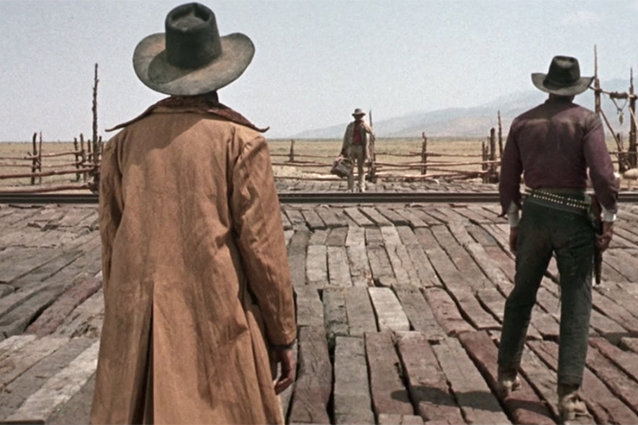
No comments:
Post a Comment